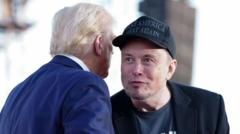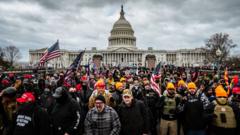Musk's role is seen as pivotal in shaping government policy and reducing federal expenditures while enhancing his influence in the administration.
Elon Musk Takes the Helm as Trump's Government Efficiency Tsar

Elon Musk Takes the Helm as Trump's Government Efficiency Tsar
Elon Musk appointed to lead Trump's new department aimed at reforming bureaucracy.
In a surprising move, billionaire entrepreneur Elon Musk has accepted a prominent role in the incoming Trump administration by leading the new Department of Government Efficiency (Doge). Announced by President-elect Donald Trump via social media, Musk will work alongside former presidential candidate Vivek Ramaswamy to streamline government operations, eliminate excessive regulations, and restructure public agencies.
Trump underscored the necessity of Musk's appointment, highlighting his advocacy for dismantling bureaucratic obstacles that he believes stifle economic growth and innovation. With Musk's suggestions on cutting the federal budget by over $2 trillion from its current $6.5 trillion, his new position could significantly influence the regulatory framework affecting his businesses, including Tesla and SpaceX.
Musk's prior management experiences at Tesla and his controversial overhaul of Twitter—now rebranded X—signal his approach to efficiency. After acquiring the platform for $44 billion, Musk executed drastic workforce reductions and restructured business models to drive profit amid a controversial shift in content moderation policies. Despite criticism of his decisions, including allegations of promoting misinformation, Musk maintains that he aims for a politically neutral platform.
Political analysts, like Thomas Gift from University College London, indicate that while Musk is tasked with tackling bureaucratic inefficiencies, he also brings substantial sway to the Trump administration. Gift notes Musk's commitment to Trump, fueled by significant financial contributions to the president's campaign and marked support at rallies.
Despite not being a US citizen, Musk's advisory role in Trump's administration reflects a growing trend where individuals with extensive business interests influence policy. Musk's privileges in this capacity are notable, as his agenda includes not just efficiency improvements for government but also potential benefits for his enterprises.
Musk's motivation may stem from a combination of personal ideology and business imperatives, as he has time and again confronted federal regulations concerning his ventures. His aspirations to colonize Mars further demonstrate an urgent desire for streamlined governance in support of such grand ambitions.
Lastly, Musk's role in the new administration presents an almost transactional relationship, where his loyalty to Trump may bear fruit in the form of significant influence and policy-making opportunities. In a rapidly changing political landscape, the implications of Musk's appointment will certainly be ones to watch, particularly in reference to ongoing global issues like the war in Ukraine and the evolving technology sector.
Trump underscored the necessity of Musk's appointment, highlighting his advocacy for dismantling bureaucratic obstacles that he believes stifle economic growth and innovation. With Musk's suggestions on cutting the federal budget by over $2 trillion from its current $6.5 trillion, his new position could significantly influence the regulatory framework affecting his businesses, including Tesla and SpaceX.
Musk's prior management experiences at Tesla and his controversial overhaul of Twitter—now rebranded X—signal his approach to efficiency. After acquiring the platform for $44 billion, Musk executed drastic workforce reductions and restructured business models to drive profit amid a controversial shift in content moderation policies. Despite criticism of his decisions, including allegations of promoting misinformation, Musk maintains that he aims for a politically neutral platform.
Political analysts, like Thomas Gift from University College London, indicate that while Musk is tasked with tackling bureaucratic inefficiencies, he also brings substantial sway to the Trump administration. Gift notes Musk's commitment to Trump, fueled by significant financial contributions to the president's campaign and marked support at rallies.
Despite not being a US citizen, Musk's advisory role in Trump's administration reflects a growing trend where individuals with extensive business interests influence policy. Musk's privileges in this capacity are notable, as his agenda includes not just efficiency improvements for government but also potential benefits for his enterprises.
Musk's motivation may stem from a combination of personal ideology and business imperatives, as he has time and again confronted federal regulations concerning his ventures. His aspirations to colonize Mars further demonstrate an urgent desire for streamlined governance in support of such grand ambitions.
Lastly, Musk's role in the new administration presents an almost transactional relationship, where his loyalty to Trump may bear fruit in the form of significant influence and policy-making opportunities. In a rapidly changing political landscape, the implications of Musk's appointment will certainly be ones to watch, particularly in reference to ongoing global issues like the war in Ukraine and the evolving technology sector.





















